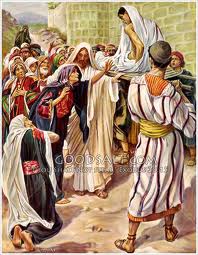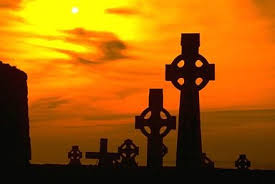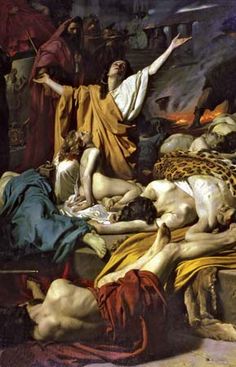
A reading from the holy Gospel according to Luke 7:11-17
Young man, I tell you to get up.
 Jesus went to a town called Nain, accompanied by his disciples and a great number of people. When he was near the gate of the town it happened that a dead man was being carried out for burial, the only son of his mother, and she was a widow. And a considerable number of the townspeople were with her. When the Lord saw her he felt sorry for her.
Jesus went to a town called Nain, accompanied by his disciples and a great number of people. When he was near the gate of the town it happened that a dead man was being carried out for burial, the only son of his mother, and she was a widow. And a considerable number of the townspeople were with her. When the Lord saw her he felt sorry for her.
‘Do not cry,’ he said.
Then he went up and put his hand on the bier and the bearers stood still, and he said,
‘Young man, I tell you to get up’.
And the dead man sat up and began to talk, and Jesus gave him to his mother.
Everyone was filled with awe and praised God saying, ‘A great prophet has appeared among us; God has visited his people’. And this opinion of him spread throughout Judaea and all over the countryside.
*****************************
Gospel Reflection from Martin Hogan the Faithful Departed Luke 7:11-17
I always find November a somewhat sombre and difficult month. The golden colours of autumn are quickly giving way to the barrenness of winter. As the month progresses, the days will get gradually shorter and darkness will increasingly make its presence felt. We lose the colours of nature and the life-giving quality of light. It is a month I associate with loss. It is perhaps fitting, then, that November is the month when we reflect upon more personal experiences of loss, the loss of significant people in our lives, people who have journeyed with us, who gave us love and whom we loved in return. The commemoration of All Souls is a day when we do that in a special way.
On this day, we feel a sense of communion with our faithful departed. As followers of a risen Lord, we believe that our faithful have not just departed from us but have also returned to God, from whom they came. We understand death as a door through which we pass back to the source of our being, the Creator of all life. We also believe that our loved ones, in passing over into God, do not break their communion with us. Even though they have departed from us, they remain in communion with us and we remain in communion with them. A vital stream of life continues to flow between our deceased loved ones and ourselves. The faith and love that bound us together in this life still binds us to them when they pass over into the next life. In the gospel reading, Jesus gives her son back to the grieving widow. One of the ways we expressed our love for our loved ones in this life was by praying for them. Our loved ones who have died can still be touched by the love that finds its voice in prayer. Prayerful remembrance is one of the ways we continue to give expression to our loving communion with them. Such prayer helps them and can also help us. None of us will have had a perfect relationship even with those we have loved the most. When someone close to us dies, there is always some unfinished business. Praying for our loved ones can help to heal whatever may need healing in our relationship with them. As a result, our communion with them can deepen after their death until it comes to fullness at the moment when we too pass over from this life and are united with them in God’s love at that great banquet of life portrayed in today’s first reading.
Although nothing is more painful than the loss of a loved one in death, our faith gives us this hope-filled vision in the face of death. In today’s second reading, Paul says that ‘hope is not deceptive, because the love of God has been poured into our hearts by the Holy Spirit which has been given to us’. Our hope is grounded in God’s love for us now, a very personal love that is poured into the hearts of each one of us through the Holy Spirit. God’s love, revealed in Jesus and poured into our hearts through the Spirit, continues to hold on to us when we pass through the door of death. As all authentic human love is always life-giving for the one loved, God’s love is supremely life-giving for us, even in the face of our bodily death. What God’s love has already done for us through his Son and the Spirit in this life is the assurance of what God’s love will do for us in eternity. As Paul says in the second reading, ‘Now that we have been reconciled [to God], surely we may count on being saved by the life of his Son’.
__________________
The Scripture Reading is taken from The Jerusalem Bible, published 1966 by Darton, Longman & Todd Ltd. and used with the permission of the publishers. http://dltbooks.com/
This Scripture Reflection is made available with our thanks from his book Reflections on the Weekday Readings Your word is a lamp for my feet and light for my path by Martin Hogan and published by Messenger Publications 2022, c/f www.messenger.ie/bookshop/
Patrick Duffy explains some other aspects of this feast.
Summary: Yesterday’s feast, the ‘Solemnity of All Saints’ or ‘All Saint’s Day’ commemorates all those who are with God in heaven, while today’s All Souls’ Day, commemorates the faithful departed, those who are still being purified and have not yet reached heaven.
 Today’s Commemoration of All the Faithful Departed, is an expression of the doctrine of the communion of saints. As traditionally explained, this doctrine means that each of the three divisions of the Church –
Today’s Commemoration of All the Faithful Departed, is an expression of the doctrine of the communion of saints. As traditionally explained, this doctrine means that each of the three divisions of the Church –
1. the Church Triumphant (all the saints in heaven),
2. the Church Militant (all those still alive on earth) and
3. the Church Suffering (all the souls in purgatory) can help the others by their merits and prayers.
Rituals Surrounding Death
In every culture death is surrounded with ritual. There is also a widespread belief that ritual and prayers can affect the fate of the soul of the dead person in the “world to come”. Christian ritual expresses what Christians believe about death, the resurrection of the body and what we call “life everlasting”.
 Old Testament
Old Testament
In the Second Book of Maccabees, after some of his soldiers had been killed in battle, Judas Maccabaeus, had their bodies laid to rest among their relatives in their ancestral tombs. However, in the process he discovered that they had concealed amulets of idols under their tunics. As this was understood as a sinful act on their part, Judas decided to have a sacrifice for sin offered on their behalf in Jerusalem. For this he collected up to 2,000 drachmae and sent it to Jerusalem.
The text of 2 Macc 12:44-45 explains:
“For if he had not expected the fallen to rise again it would have been superfluous and foolish to pray for the dead, whereas if he had in view the splendid recompense for those who make a pious end, the thought was holy and devout. This is why he had this atonement sacrifice offered for the dead, so that they might be released from their sin.”
Early Christian Customs
In the early centuries, prayers for the dead were inscribed on the walls of the Roman catacombs where Christians were buried. Some Roman funeral customs were retained by the Early Church Burials once they were sure they were not incompatible with their faith.

In the second century, prayers for the dead and celebrations of the Eucharist on the anniversary of a loved one took place. Initially these celebrations were on the third day after burial and the yearly anniversary. Later the seventh day, the thirtieth day and the fortieth day also became special days for commemorating the deceased person. These fixed days for the memorial of the dead with the Eucharist probably replaced the ancient sacrifices for the dead and sometimes perhaps the refrigerium, or memorial meal eaten at the graveside of the person.
Commemoration of All the Faithful Departed
The first mention of a day specially dedicated to commemorating all the faithful departed is found in a monastic rule attributed to Saint Isidore of Seville (died 636), who ordered his monks to celebrate the Eucharist for the souls of the departed on the Monday after Pentecost. The choice of this day may be due to the fact that the emerging feast of All Saints was celebrated on the Sunday after Pentecost, following some examples from the Christian East.
2nd Nov.
In 998 St Odilo of Cluny set aside the day immediately following All Saints (2nd November) as a day when “the monks at Cluny would keep with joyous affection the memory of all the faithful departed who have lived from the beginning of the world until the end”. The custom spread to England and to Spain. In Valencia, the custom of saying three Masses was introduced by the Dominicans in the early 14th century. In 1915, during World War I, Pope Benedict XV extended the feast and the privilege of saying three Masses to the universal Church.
Purgatory
The feast draws on the Catholic doctrine of Purgatory, which itself draws on the practice of praying for the dead. While the Church believes that all those who die in God’s grace and friendship can be sure of eternal life, nevertheless after death they undergo a purification to achieve the holiness necessary to enter heaven  (Catechism of the Catholic Church 1030-32). The Catechism of the Catholic Church also invokes the communion of saints, the teaching on indulgences and the Church’s treasury of spiritual goods (CCC 1476-7) to support the application of indulgences by those still on earth to the souls in purgatory.
(Catechism of the Catholic Church 1030-32). The Catechism of the Catholic Church also invokes the communion of saints, the teaching on indulgences and the Church’s treasury of spiritual goods (CCC 1476-7) to support the application of indulgences by those still on earth to the souls in purgatory.
Popular Piety
While encouraging various forms of popular piety in connection with this feast, such as visiting the graves of loved ones and praying for them, the Church warns against any semblance of ancestor worship, belief in reincarnation or divination. On the other hand, it sees this feast and popular customs connected with it as an antidote to the culture of denial of death in contemporary society. It also warns against all forms of “commercialisation of the dead”, which exploit the emotions of the faithful in pursuit of commercial profit. See the Directory on popular piety and the liturgy, paragraphs 256-260.
________________________
******************************
Memorable Reminder for Today
It is therefore a holy and wholesome thought
to pray for the dead, that they may be loosed from sins.
~2 Maccabees 12:4 ~
******************************